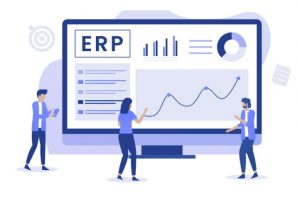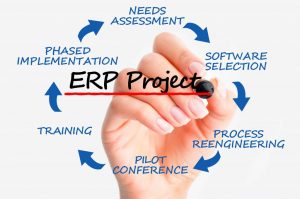ERP testing is a Quality Assurance (QA) process meant to ensure that the ERP system is operationally sound. Throughout the various stages of installation, ERP testing prevents the software from crashing at the time of go-live.
Having an ERP Software in place will make handling the various automated operations easier. Proper testing and validation will limit the number of errors caused by software failures. Testing lets you ensure that the system is working correctly and that reports and forms are generated correctly.

What Is The Need For ERP Testing?
Before deploying an Enterprise Resource Planning system, a corporation must ensure that it is well-designed and free of severe defects. Validate all roles, setups, and access privileges to ensure the information under each department’s administration is intact and secure.
The entire organization is jeopardized if a single workflow fails. The software’s purpose of streamlining labor procedures is not met. Worse, it has the potential to bring the entire enterprise to a standstill.
When a program lags and performs inadequately, it generates more barriers than opportunities for productive collaboration. In the lack of adequate testing, the installation of a device is compromised. Instead, one side will be unable to expand its consumer base, while another will be unable to use the service.

Choosing The Right Type Of Testing Methodology
A few of the testing methodologies that can be used to test an ERP are listed below:
Performance testing
This testing method assesses the ERP system’s capacity to accomplish personalized tasks in challenging environments and conditions. Because ERP operates other integrated systems, it is critical to verify its performance during high-demand conditions, such as when data flows and transactions are high.
Automated testing
This type of testing refers to intelligent automation, which makes tiresome jobs easier and faster to complete by completing them all at once. A corporation must select appropriate automation tools and cover all test procedures for good outcomes.
Integration testing
Integration testing entails evaluating business issues. The goal is to see how successfully the ERP system integrates into the company’s business operations to produce the intended results.
Security Testing
End-to-end worker and employer records are included in the ERP solution. As a result, sensitive data must only be accessed by authorized people on a need-to-know basis. This will also help to reduce the likelihood of data theft.
Other test methods comprise automated testing, compatibility testing, regression testing, scalability testing, and GUI testing.

Why Incorporate Automated ERP Testing?
1. Automated testing can assist you in locating and correcting faults in your software before they become major issues.
2. Automated testing ensures that your organization’s new ERP system is completely operational as per the business requirements established at the start of the deployment.
3. ERP systems combine different data sources into a consolidated data pool.
4. It can also enhance the customer experience by preventing annoying problems that can leave potential members uncertain if they make mistakes and require more training.
5. Given the intricacy of the layout of these systems, automation is critical for reducing the labor and time required for regression testing. It is also a necessary component for increasing test coverage and, as a result, quality assurance.
To conclude
Because ERP testing incorporates users from many groups or stakeholders, this technique is critical in training how quickly users accept new software.
In addition, actual users will benefit from the training because they will teach other groups how to use the ERP process mapping.
We offer ERP development services at Connected IT Consulting to help you streamline workflows and automate company processes. Our developers employ a strategic strategy and cutting-edge technology to help firms achieve long-term growth.
Contact our development team to reap the benefits of ERP implementation!
Related Links
ERP Project Management
Business Process mapping
Small Business ERP
ERP Consulting



